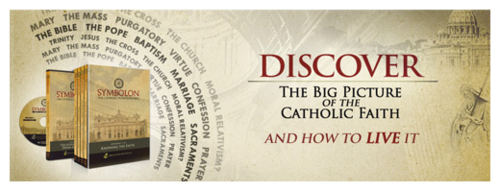Carl E. Olson's Blog, page 107
March 6, 2014
His Beatitude Sviatoslav Shevchuk speaks truth to secular powers
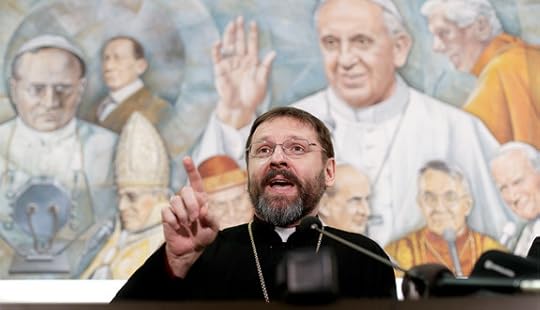
Archbishop Sviatoslav Shevchuk of Kiev-Halych, major archbishop of the Ukrainian Catholic Church, speaks Feb. 25 during a Rome news conference on the recent events in the Ukrainian capital. (CNS photo/Max Rossi, Reuters)
His Beatitude Sviatoslav Shevchuk speaks truth to secular powers | Michael J. Miller | CWR
The head of the Ukrainian Greek Catholic Church is giving witness similar to that of Bl. John Paul II
In the midst of the unfolding societal, political and now international crisis in Ukraine, the Head of the Ukrainian Greek Catholic Church has been a constant and courageous witness to the moral law, human rights and Catholic social teaching. The world has not seen such a tutorial on how the Church should defend peace and justice since Blessed John Paul II supported the Solidarity movement in his pastoral visits to his native Poland while it labored under a Communist regime.
Just as the Polish Pope’s first Encyclical Redemptor hominis was addressed, not only to Catholics, but “to all men and women of good will”, His Beatitude Sviatoslav Shevchuk has made common cause with leaders of the three Orthodox Churches in Ukraine and of the Baptist, Lutheran and Jewish and Muslim communities, as a member of the All-Ukrainian Council of Churches and Religious Organizations (AUCCRO), which has acted as a mediator between the Ukrainian civil authorities and the “EuroMaidan” protestors on Independence Square in Kyiv.
At the same time, the Head of the UGCC carefully instructed his priests about the fine line between ministering to demonstrators and leading a demonstration.
March 5, 2014
Some Lenten Links
Meatless links, it goes without saying.
• On Catholic World Report, Mark Shea writes about "living lent in the fast lane":
Lent is the reminder that all this sort of thinking is, well, ashes. Bupkis. Skubala. “Refuse”—as English translators of Scripture politely put it. It’s the reminder that this passing world is passing indeed and that none of that stuff is going to matter in the final analysis. Lent is for focusing the mind, heart, and spirit on God: for getting away from it all, not on an all-expense-paid Lenten Caribbean Cruise, but to the desert.
That’s the first thing to notice about Lent: the desert. One of the striking insights that Christianity carries over from Judaism is that spiritual purification happens in the desert, not in a leafy glade. It’s not something we like, but it is something we intuit is true nonetheless. Israel escapes Egypt and begins a journey that, for the ancient trade caravans, took eleven days. But for the People of God, it takes forty years. Why? Because that’s what it took. Getting Israel out of Egypt was easy. Getting Egypt out of Israel? That took some doing. A whole generation would have to die off and a new one, purified by the astringency of the desert, would have to arise before Israel was ready to enter the Promised Land.
• Also on CWR, Dr. Adam DeVille considers the different approaches taken to fasting in the Western and Eastern churches:
On paper, Eastern fasting discipline—about which I have published several articles over the last dozen years—seems very strict indeed (though in practice not everyone follows it); and on paper Western fasting discipline seems rather minimal—though in practice nothing prevents Western Christians from undertaking a more rigorous fast. But both disciplines currently have some rather strange logic behind them, which I wish to challenge here by means of a “scholastic” method. I shall consider the question in two articles.
• Homiletic & Pastoral Review has posted two Lenten pieces: an essay, "Lent: A Time for Conversion", by Fr. Richard Gribble, CSC, and a reflection by HPR's editor, Fr. David Vincent Meconi, SJ, titled, "Our Lenten Imitation of Christ".
• In an excerpt from his book, Evangelical Is Not Enough, Dr. Thomas Howard writes:
Lent, like Advent, is a time of penitence. Here we identify ourselves with the Lord's fast and ordeal in the wilderness, which He bore for us.
This raises a point worth noting in passing. There are some varieties of Protestant theology and spirituality that so stress "the finished work of Christ" and the fact that He accomplished everything, that they leave no room at all for any participation on our part. Such participation, encouraged by the ancient Church, does not mean that we mortals claim any of the merit that attaches to Christ's work, much less that we can by one thousandth particle add to His work. Nevertheless, the gospel teaches us that Christians are more than mere followers of Christ. We are His Body and are drawn, somehow, into His own sufferings. We are even "crucified" with Him.
Read the entire piece on Insight Scoop.
• In the essay, "Lent: Why the Christian Must Deny Himself", written many years ago but worth revisiting, Benedictine Brother Austin G. Murphy writes:
We can be grateful that the customs of giving up something for Lent and abstaining from meat on Fridays during Lent have survived in our secular society. But, unfortunately, it is doubtful that many practice them with understanding. Many perform them in good faith and with a vague sense of their value, and this is commendable. But if these acts of self-denial were better understood, they could be practiced with greater profit. Otherwise, they run the risk of falling out of use.
A greater understanding of the practice of self-denial would naturally benefit those who customarily exercise it during Lent. Better comprehension of self-denial would also positively affect the way Christians live throughout the year. The importance of self-denial can be seen if we look specifically at fasting and use it as an example of self-denial in general. Indeed, fasting, for those who can practice it, is a crucial part of voluntary self-denial.
But since we live in a consumerist society, where self-indulgence rather than self-denial is the rule, any suggestion to fast will sound strange to many ears. It is bound to arouse the questions: Why is fasting important? Why must a Christian practice it? Using these questions as a framework, we can construct one explanation, among many possible ones, of the importance of self-denial.
The full essay can be read on Ignatius Insight.
• My feature article, "Pray your way through Lent", is available Our Sunday Visitor's website. In it, I offer Scriptural reflections on each week of Lent, based on the readings for Mass, along with a short prayer. Here is the first one, for the week of Ash Wednesday. Here are direct links:
• Ash Wednesday | March 5 — Saturday, March 8
• First Week of Lent | Sunday, March 9 — Saturday, March 15
• Second Week of Lent | Sunday, March 16 — Saturday, March 22
• Third Week of Lent | Sunday, March 23 — Saturday, March 29
• Fourth Week of Lent | Sunday, March 30 — Saturday, April 5
• Fifth Week of Lent | Sunday, April 6 — Saturday, April 12
• Holy Week and the Triduum | Sunday, April 13 — Saturday, April 19
The entire piece, with graphics, can be downloaded as a PDF. I also put together a guide to reflecting upon and praying more deeply the "Our Father".
• The Magis Center, founded by Fr. Robert Spitzer, SJ, has daily reflections for Lent based in Ignatian spirituality. From today's edition:
Sin is disorder.
Lent is an opportunity for us to repent and re-order our lives to God. The first words of Scripture we hear today reflect this reality: Even now, says the LORD, return to me with your whole heart, with fasting, and weeping, and mourning. Why such things? They remind us that we do not live on “bread alone” (Matt 4:4), and that it is God who fills us with joy and peace (Romans 15:13). By fasting, by accepting our deep need for God we return to the natural order of things and find peace for, as St. Augustine has said, “Peace is the tranquility of order.” When all is right in the world, when we let God be God, we find peace and plenty for if God is our first desire, we are filled.
It is interesting, then, that so many Catholics who have in many respects turned away from their faith choose this day to return. There is something about the ritual of the ashes and the mark upon the forehead that draws them back. Some say they see it as an opportunity to publically announce their identity as Catholics; some just find the ritual of it to be otherwise rewarding. But what is really happening here.
• The Aggie Catholics site has a huge list of Lenten resources and links.
• A great musical resource is the newly released CD, "Lent at Ephesus", which was reviewed recently for CWR by Dr. Christopher Morrissey, professor of philosophy and Latin, and accomplished musician.
"Great Lent" by Thomas Howard

Great Lent | Thomas Howard | From Evangelical Is Not Enough: Worship of God In Liturgy and Sacrament | Ignatius Insight
Presently Lent arrives. This is the forty days leading up to Easter, which also recall the forty days of Christ's temptation in the wilderness. There is a telescoping of things here, since His temptation did not in actual fact immediately precede His Passion, but "liturgical time" is such that spiritual significance may override chronological exactness.
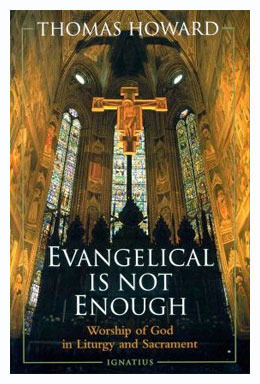
Lent, like Advent, is a time of penitence. Here we identify ourselves with the Lord's fast and ordeal in the wilderness, which He bore for us.
This raises a point worth noting in passing. There are some varieties of Protestant theology and spirituality that so stress "the finished work of Christ" and the fact that He accomplished everything, that they leave no room at all for any participation on our part. Such participation, encouraged by the ancient Church, does not mean that we mortals claim any of the merit that attaches to Christ's work, much less that we can by one thousandth particle add to His work. Nevertheless, the gospel teaches us that Christians are more than mere followers of Christ. We are His Body and are drawn, somehow, into His own sufferings. We are even "crucified" with Him.
My own tradition stressed this, but it was taught as a metaphor that meant only the putting to death of sin in our members. There was very little said about the sense in which Christ draws His Body into His very self-giving for the life of the world and makes them part of this mystery. Saint Paul uses extravagant language about his own filling up "that which is behind of the afflictions of Christ." We had succinct enough explanations as to what he might have meant here, but these explanations allowed no room for any notion of our participating in Christ's offering. This was looked upon as heresy, violating the doctrine of grace .n which all is done by God and nothing by us. We are recipients only. That the gracious donation of salvation by God could in any manner include His making us a part of it all, as He made the Virgin Mary an actual part of the process, and as Saint Paul seems to teach, was not the note struck.
The ancient Church, in its observance of Lent, once more asks us to move through the gospel with Christ Himself. The most obvious mark of Lent to a newcomer is the matter of fasting. I had own about this practice all my life. My Catholic playmates would give up chocolates or Coke or ice cream for Lent. I also knew that a few devout people in my own tradition of evangelicalism practiced fasting now and again for special purposes—a time of especially concentrated prayer, for example.
I myself thought of Lenten fasting and also of the old Catholic practice of refusing meat on Fridays as being legalistic, and perhaps even heretical, since it seemed to entail some notion of accruing merit. Since Christ had done all, why should we flagellate ourselves this way? Was it not a return to the weak and beggarly elements condemned by Saint Paul? Was it not to be guilty of the very thing that the apostle had a sailed the Galatian Christians for?
I discovered that the ancient Church teaches just what the New Testament teaches on the point, namely, that fasting is a salutary thing for us to undertake. Jesus fasted and assumed that His followers would. "When ye fast," He said, not "if." Saint Paul both practiced it and taught it. It seems to constitute a reminder to u that our appetites are not all and that man shall not live by bread alone. Furthermore, if we may believe the universal testimony of Christians who do practice it, it also clarifies our spiritual vision somehow. Lastly, it is a token of the Christian's renunciation of the world. There is no thing that a Christian will insist he must have at all costs. Fasting supplies an elementary lesson here.
Lent asks us to ponder Christ's self-denial for us in the wilderness. It draws us near to the mystery of Christ's bearing temptation for us in His flesh, and of how in this Second Adam our flesh, which failed in Adam, now triumphs.
Lent also leads us slowly toward that most holy and dread of all events, the Passion of Christ. What Christian will want to arrive at Holy Week with his heart unexamined, full of foolishness, levity, and egoism? To those for whom any special observances hint of legalism or superstition one can only bear witness that the solemn sequence of Lent turns out to be something very different from one's private attempts at meditating on the Passion. To move through the disciplines in company with millions and millions of other believers allover the world is a profoundly instructive thing.
Lent begins with Ash Wednesday. The first time ashes were imposed on my forehead, I found a cacophony of voices inside me: "Come! Now you have betrayed your background! This is straight back to the Dark Ages. Fancy Saint Paul's doing this!"
I knew it was not so when the priest came along with the little pot of damp ashes and with his thumb smudged my forehead—my forehead, the very frontal and crown of my dignity as a human being!—and aid, "Remember, O man, that dust thou art and unto dust thou shalt return."
I knew it was true. I would return to dust, like all men, but never before had mortality come home to me in this way. Oh, I had believed it spiritually. But surely we need not dramatize it this way....
Perhaps we should, says the Church. Perhaps it is good for our souls' health to recall that our salvation, far from papering over the grave, leads us through it and raises our very mortality to glory. We, like all men, must die. I felt the strongest inclination to wave the priest past as he approached me in the line of people kneeling at the rail. Not me—not me—like Agag coming forth delicately, hoping that the bitterness of death was past. Yes, you. Remember, O man....
I was beginning to learn that when we encounter some "spiritual" truth in our bodies, it is brought home to us. We can meditate on suffering all day long, for example, but let us have migraines, and we know something we could not have known through merely mulling over the doctrine of suffering. We can meditate on love all day long, but let us kiss the one we long for, and we know immediately something we could not have known if we had thought about love for a thousand years. Nay—our very salvation came to us in the body of the incarnate God. "O generous love! that He who smote/In Man for man the foe,/The double agony in Man/For man should undergo," says Cardinal Newman's hymn. The ashes effected something in me more than a smudge on my forehead. I had felt, if only for a moment, the thing that I wished most earnestly to be exempted from: death.
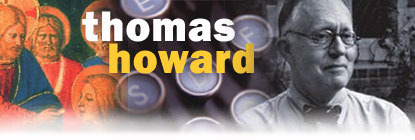
• Thomas Howard biography
• Thomas Howard Books Published by Ignatius Press
• Interviews and Book Excerpts
Related Ignatius Insight Articles:
• Lent: Why the Christian Must Deny Himself | Brother Austin G. Murphy, O.S.B.
• The Old Age and the New | Thomas Howard | From Chance or the Dance?
• "I never thought I wanted to be a writer" | An Interview with Dr. Thomas Howard
• Catholic Spirituality | Thomas Howard | From The Night Is Far Spent
• Reading T.S. Eliot's "Four Quartets" | An Interview with Dr. Howard about Dove Descending: A Journey Into T.S Eliot's Four Quartets
• Thomas Howard and the Kindly Light | An Interview with Dr. Howard about his book, Lead, Kindly Light
• An Hour and a Lifetime with C.S. Lewis | An Ignatius Insight Interview with Dr. Thomas Howard
• "Tradition" | Chapter 14 of On Being Catholic | Thomas Howard
• The Quintessential – And Last – Modern Poet | Fr. George William Rutler | The Foreword to Dove Descending: A Journey Into T.S. Eliot's Four Quartets, by Thomas Howard
Thomas Howard was raised in a prominent Evangelical home (his sister is well-known author and former missionary Elisabeth Elliot), became Episcopalian in his mid-twenties, then entered the Catholic Church in 1985, at the age of fifty. He is an acclaimed writer and scholar, noted for his studies of Inklings C.S. Lewis ( Narnia & Beyond: A Guide to the Fiction of C.S. Lewis) and Charles Williams (The Novels of Charles Williams), as well as books including Christ the Tiger, Chance or the Dance?, Hallowed be This House, Evangelical is Not Enough, If Your Mind Wanders at Mass, On Being Catholic, The Secret of New York Revealed, and Lead, Kindly Light: My Journey to Rome, the story of his embrace of Catholicism, and Dove Descending: A Journey Into T.S. Eliot's Four Quartets. Visit his IgnatiusInsight.com author page here.
"Living Lent in the Fast Lane" by Mark Shea
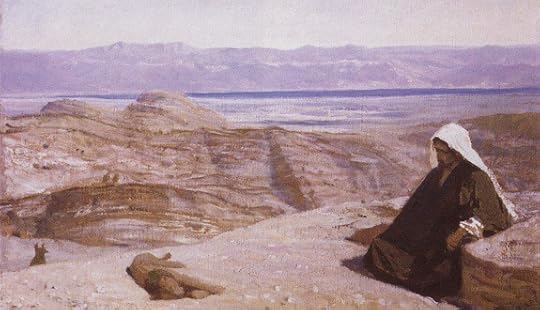
"Has been in the desert" by Vasily Polenov (1909), from the series, "The Life of Christ" (Wikipaintings.org)
Living Lent in the Fast Lane | Mark Shea | CWR
Prayer, fasting, and almsgiving remain the basic pillars of our Lenten practice for a very good reason
I’m pretty lousy at doing Lent. So I’m a natural for yakking about it since (just between you and me) you’re pretty lousy at it too, no? Seriously, who says, “I am the most awesome penitent of all time!”
We all do a lousy job at Lent, by and large, because Lent is about repentance and mortification and preparation for death with Jesus on the cross and self-donating love that resolutely puts aside our own wants, needs, and desires aside in favor of obedience to God and the love of our neighbor. And, come on, who wants that?
What I want is what I want. I want a salvation that comes with the praises of this world. I want people applauding me, understanding me, acclaiming my goodness and intelligence. I want cash prizes and awards ceremonies where (after the tearful tribute from, say, the Pope which concludes, “Thanks Mark. I have learned so much from you!”) the people I admire most in this world leap to their feet and drown me with thunderous applause and roses. I want pan-fried oysters and lots of ‘em, followed by chocolate and some favorite movie or book to curl up with. I want leisure to finally work on that novel I’ve been noodling. I want a prayer life in which I am given to instantly see and understand divine mysteries and pain is simply a theoretical problem that, at worst, troubles somebody else. I want to be seen as generous, but I don’t want it to cost me anything. I want to have solid abstract answers to the problem of suffering without needing to actually have any contact with icky, suffering people. I want to be 19 forever, with a hundred bucks in my pocket and all the insolence of youth propelling me into a future where the world is mine, babes are free for the taking, and responsibility is for suckers, all under a smiling summer sun.
In short, I want God to finally get over his intractable hostility to the world, the flesh, and the devil and broker some kind of reasonable compromise between holiness and selfishness. Can’t we all just get along?
Going into the desert
Lent is the reminder that all this sort of thinking is, well, ashes. Bupkis. Skubala. “Refuse”—as English translators of Scripture politely put it. It’s the reminder that this passing world is passing indeed and that none of that stuff is going to matter in the final analysis. Lent is for focusing the mind, heart, and spirit on God: for getting away from it all, not on an all-expense-paid Lenten Caribbean Cruise, but to the desert.
That’s the first thing to notice about Lent: the desert.
March 4, 2014
Lent: Why the Christian Must Deny Himself

Lent: Why the Christian Must Deny Himself | Brother Austin G. Murphy, O.S.B. | IgnatiusInsight.com
We still ask ourselves as Ash Wednesday approaches, "What am I doing for Lent? What am I giving up for Lent?" We can be grateful that the customs of giving up something for Lent and abstaining from meat on Fridays during Lent have survived in our secular society. But, unfortunately, it is doubtful that many practice them with understanding. Many perform them in good faith and with a vague sense of their value, and this is commendable. But if these acts of self-denial were better understood, they could be practiced with greater profit. Otherwise, they run the risk of falling out of use.
A greater understanding of the practice of self-denial would naturally benefit those who customarily exercise it during Lent. Better comprehension of self-denial would also positively affect the way Christians live throughout the year. The importance of self-denial can be seen if we look specifically at fasting and use it as an example of self-denial in general. Indeed, fasting, for those who can practice it, is a crucial part of voluntary self-denial.
But since we live in a consumerist society, where self-indulgence rather than self-denial is the rule, any suggestion to fast will sound strange to many ears. It is bound to arouse the questions: Why is fasting important? Why must a Christian practice it? Using these questions as a framework, we can construct one explanation, among many possible ones, of the importance of self-denial.
To answer the question "Why must the Christian fast?" we should first note that fasting, in itself, is neither good nor bad, but is morally neutral. But fasting is good insofar as it achieves a good end. Its value lies in it being an effective means for attaining greater virtue. And because it is a means for gaining virtue– and every Christian ought to be striving to grow in virtue–there is good reason to fast.
Some people point out that fasting is not the most important thing and, therefore, they do not need to worry about it. Such reasoning displays a misunderstanding of our situation. But, since the excuse is common enough, some comments to refute it are worthwhile.
Doing Small Things Well
First, while it is true that fasting is not the most important thing in the world, this does not make fasting irrelevant or unimportant. There are, certainly, more urgent things to abstain from than food or drink, such as maliciousness, backbiting, grumbling, etc. But a person is mistaken to conclude that he therefore does not need to fast. He should not believe that he can ignore fasting and instead abstain in more important matters. Rather, fasting and avoiding those other vices go hand in hand. Fasting must accompany efforts to abstain in greater matters. For one thing, fasting teaches a person how to abstain in the first place.
Outstanding new video-based Faith Formation Series launched
San Francisco, March 4, 2014 – An exciting, new, comprehensive, faith formation video-based program known as Symbolon is being launched by the Augustine Institute, in conjunction with Lighthouse Catholic Media and Ignatius Press.
Through beautifully crafted presentations and state-of-the-art video, speaker and author Dr. Edward Sri leads a dynamic team of outstanding teachers to provide a clear and compelling vision of Catholic beliefs and practices. Featured presenters include Dr. Tim Gray, Johnnette Benkovic, Patrick Coffin, Teresa Tomeo, Jason and Crystalina Evert, Leah Darrow, Jim Beckman, Curtis Martin, Chris Stefanick, and Ted Sri.
Featuring on-location filming in Rome, the Holy Land, Calcutta, and elsewhere, Symbolon opens up the “big picture” of the Catholic faith. It provides pastors and other leaders with a superb resource for the New Evangelization as well as authentic and engaging catechesis.
Symbolon comes in two parts, the first of which—Knowing the Faith (ten episodes; 5 DVDs)—is being released now, the second part—Living the Faith (ten episodes; 5 DVDs) will come in the fall. Knowing the Faith focuses on the core beliefs of the Catholic Church: the Trinity, the story of creation, the fall, and redemption; the Church, Mary and the saints, and the Last Things. Living the Faith will focus on the sacraments and the moral life.
Excellent for RCIA, parish adult faith formation, men’s groups, women’s groups, family life ministry, catechist formation, and individual home study, Symbolon includes full-color companion resources—a Leader’s Guide and a Participant’s Guide to take people deeper into the life of faith.
“Many people have a fragmented understanding of the faith, " notes Dr Sri, who is an Augustine Institute professor of theology and director of the Symbolon program. "They might know there are 12 apostles, 10 commandments, 7 sacraments and 3 Persons of the Trinity, but how does it all fit together? We wanted to build a series that walks through the entirety of the Catholic faith in a way that would shape their lives.”
“We wanted to build a program that walks through the entirety of the Catholic faith in a way that would shape people’s lives. This series will help people know their faith and how to live it, as they grow in their relationship with Christ and the Church”, Dr Sri adds.
The Augustine Institute, a nationally known graduate theology program, produced Symbolon, and has joined forces with two major Catholic media apostolates, Lighthouse Catholic Media and Ignatius Press, to distribute Symbolon through parishes, bookstores, and online.
“It is truly amazing that the Augustine Institute and Lighthouse Catholic Media were both ‘officially’ founded in the same year, in the same month, and on the same day: the Feast of the Assumption 2005. We believe that through God’s Grace and the Blessed Virgin Mary’s intercession, this new partnership will help millions of more Catholics fall more deeply in love with our Lord and His Church!”, says Mark Middendorf, President of Lighthouse Catholic Media.
“We at Ignatius Press are excited by our evangelical collaboration with the Augustine Institute and Lighthouse Catholic Media”, according to Mark Brumley, President of Ignatius Press. “These are two apostolates thoroughly focused on serving the Lord and his Church. Symbolon is a great resource. May the Lord bless the users of Symbolon!”
More information on the Symbolon program, including video clips and sample resources pages from the series, is available at www.lighthousecatholicmedia.org/symbolon and www.ignatius.com. Symbolon is available for order at those websites and at local Catholic bookstores.
Symbolon director Edward Sri, Lighthouse Catholic Media President Mark Middendorf, and Ignatius Press President Mark Brumley are available for interviews about Symbolon. To request an interview, please contact: Rose Trabbic, Publicist, Ignatius Press at (239) 867-4180 or rose@ignatius.com
Christians in Ukraine: Ecumenism in the Trenches
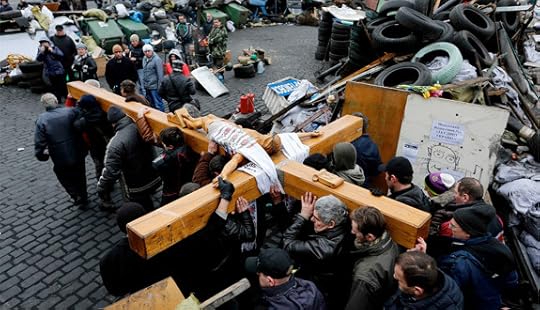
Mourners carry a large wooden crucifix past a barricade during a memorial procession in Independence Square in Kiev, Ukraine, Feb. 25. Dozens of protesters have been killed since November. (CNS photo/Yannis Behrakisi, Reuters)
Christians in Ukraine: Ecumenism in the Trenches | Fr. Cyril Hovorun | Catholic World Report
The conflict between the state and the society in Ukraine has led to a significant, and positive, shift in perspectives among Orthodox, Catholics, and Protestants
The religious map of Ukraine on the eve of the protests that began in November 2013, looked like a mosaic of military camps. The troops did not conduct active maneuvers nor openly attacked each other. They just stayed in their tranches, while their generals occasionally met on the neutral ground to imitate negotiations on truce, which none of them really wanted. The situation changed, however, when the civil protests began in November 2013 at the central square of Kiev, the Maidan of Independence. The civil awakening urged the Ukrainian churches to reconsider their relationship to each other. This followed the reconsideration of their relationship with the Ukrainian state and the society. The common fight for restoration of social justice and later on against the aggression of Russia provide the Ukrainian Churches a chance for reconciliation.
Statistics
Ukraine is religiously diverse. No one Church has a monopoly. The largest is the Ukrainian Orthodox Church (UOC) in communion with the Patriarchate of Moscow. According to the official statistics, in January 2013 it had 12,485 registered communities. This is the only Ukrainian church recognised by the fellowship of the Orthodox Churches worldwide. For 22 years the Primate of this Church was Metropolitan of Kiev Volodymyr Sabodan. In recent months, however, his health condition has dramatically deteriorated. For this reason on February 24, the Synod of this Church elected as Locum Tenens of the Kievan See Metropolitan Onufry.
The second largest Church is the Patriarchate of Kiev (UOC KP), which was founded in 1992 by the former exarch of Ukraine Filaret Denisenko, who was anathematised for this by the Patriarchate of Moscow. This Church, according to the same statistics, counted 4,536 registered communities in the beginning of 2013.
The third is the Ukrainian Autocephalous Orthodox Church (UAOC) with 1,205 registered communities. It originates from the Autocephalous movement that started in 1918, then moved into the emigration, mostly Canada and the US, and after Ukraine became independent, returned to its motherland as a UAOC.
There is also a Ukrainian Greek-Catholic Church (UGCC), a Catholic Church sui iuris, which follows the eastern rite. In January 2013, this Church counted 3,734 registered communities, mostly in the western Ukrainian region of Galicia. It nevertheless developed a distinct social teaching and has a powerful voice recognised throughout the whole country. The rest of the Ukrainian Churches, including the Roman Catholic Church with 919 communities, act publicly mostly through the All-Ukrainian Council of the Churches and Religious Organisations. This Council is the most effective platform of cooperation between different religious groups in Ukraine, including Jewish and Muslim.
Civil awakening
All major Ukrainian Churches, including the Greek-Catholic Church, belong to the eastern Christian tradition. According to this tradition, the Church gives priority to relations with the state, and not so much with the society. The Maidan, however, urged the Ukrainian Churches to begin realising that the unilateral relationship of the Church with the state is insufficient.
March 3, 2014
Make Your Lent Beautiful with "Lent at Ephesus"
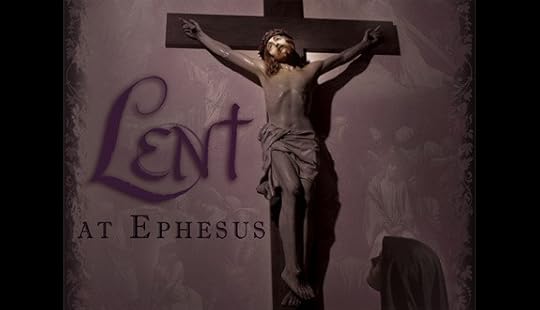
Make Your Lent Beautiful with Lent at Ephesus | Christopher S. Morrissey | CWR
A practical guide to incorporating the latest hit album from the Benedictines of Mary, Queen of Apostles into your Lenten meditations.
Lift high the cross? Yes, and right to the top of the classical music charts.
With their third hit album in as many years, the Benedictines of Mary, Queen of Apostles, have done it again. They are at the top of the Billboard Classical chart. And this time, they are proclaiming the love of Christ with a terrific new CD that is packed full of Lenten repertoire.
The album is called Lent at Ephesus because, since 2006, these cloistered nuns have been in the Diocese of Kansas City-St. Joseph in Missouri at the Priory of Our Lady of Ephesus. The nuns, in their daily liturgical practice, are accustomed to chanting the very best of the Church’s musical treasures. They follow a monastic horarium as laid out by St. Benedict in his Rule. They chant the Divine Office together eight times a day in Latin according to the 1962Breviarium Monasticum.
Their first album, Advent at Ephesus (2012), spent six consecutive weeks at number one on Billboard’s Classical Traditional Music chart. Their second album, Angels and Saints at Ephesus (2013), spent 13 consecutive weeks at number one on the same chart.
What is so wonderful about each one of their CDs is that these nuns sing with such remarkable sincerity. They thus reveal to the listener why this traditional music exists: namely, in order to embody the lovely movements of a prayerful heart.
Pope Francis garnered much attention when, in Evangelii Gaudium, he condemned what he called “narcissistic and authoritarian elitism” (EG 95): “In some people we see an ostentatious preoccupation for the liturgy, for doctrine and for the Church’s prestige, but without any concern that the Gospel have a real impact on God’s faithful people and the concrete needs of the present time. In this way, the life of the Church turns into a museum piece or something which is the property of a select few.”
As if to illustrate precisely the opposite—how to avoid “narcissistic and authoritarian elitism”—the Benedictines of Mary, Queen of Apostles, have made this beautiful music easily accessible and widely available.
The UK Ordinariate Three Years Later: A Snapshot
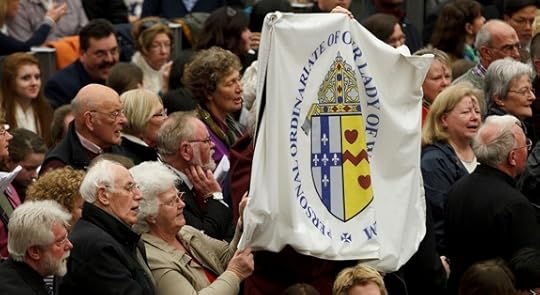
Members of the Personal Ordinariate of Our Lady of Walsingham in England attend Pope Benedict XVI's general audience in Paul VI Hall at the Vatican in February 2012. (CNS photo/Paul Haring)
The UK Ordinariate Three Years Later: A Snapshot | Joanna Bogle | CWR
Some former Anglican communities thrive, some still struggle to find a permanent home after crossing the Tiber.
“Auntie Joanna, can I help you with your knitting?”
The difference between tapestry and knitting was not apparent to an uninitiated small boy, fascinated by the intricacies of bright wool and needles. Not one to discourage youthful enthusiasm, I gingerly showed my young nephew how to insert the wool through the mesh with the special blunt-ended needle, and with deep breaths of satisfaction he produced some creditable stitches. His contribution to the kneeler for St. Anselm’s, Pembury was small, but in a way he was helping to make history.
There are a great many magnificent and ancient churches in England, but St Anselm’s is not one of them. It’s a smallish, bleak hall, standing on a green rising up from the main road in Pembury, a village near Tunbridge Wells in Kent. It has bare walls, plastic chairs, a cramped feel, and no external ornaments to indicate its sacred use. And it is rented out for much of the week for ballet classes and a children’s playgroup.
But the reason for its place in history is important. The hall is part of the Catholic parish of Tunbridge Wells. When Pope Benedict XVI created the Ordinariate of Our Lady of Walsingham, an Anglican clergyman, the Rev. Ed Tomlinson—then vicar of a large Anglican church in Tunbridge Wells—responded with eagerness. Pope Benedict’s call, in his message Anglicanorum Coetibus—“to groups of Anglicans”—was an invitation to come into full communion with the Catholic Church, bringing along Anglican traditions, music, and what has been generally described as “Anglican patrimony.”
Father Ed—having been ordained a Catholic priest after due discernment, study, and acceptance—had to give up the beautiful church of which he had been vicar.
March 1, 2014
Idolatries. Anxieties. Priorities.
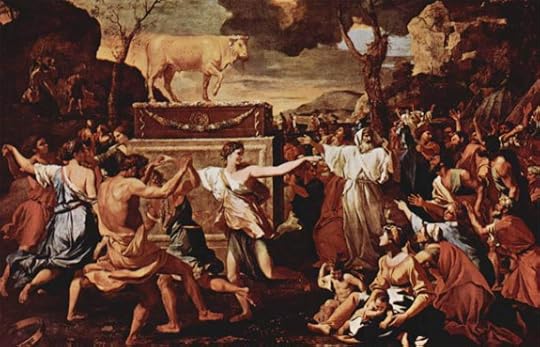
"The Adoration of the Golden Calf" by Nicolas Poussin
A Scriptural Reflection on the Readings for Sunday, March 2, 2014 | Carl E. Olson
Readings:
• Is 49:14-15
• Ps 62:2-3, 6-7, 8-9
• 1 Cor 4:1-5
• Mt 6:24-34
Idolatries. Anxieties. Priorities.
If you are anything like myself, you are familiar with these three. We have to deal with them nearly every day in ways big and small, obvious and not so obvious. And they are closely connected with one another, which is one reason, I think, that Jesus spoke about them together in the Sermon on the Mount.
“American Idol” might be a popular television show, but the word “idolatry” is rarely used in common conversation. And yet, as the Catechism notes, it “remains a constant temptation to faith.” In fact, we Americans have become incredibly sophisticated in committing idolatry and convincing ourselves that it is not idolatry, but something necessary and even good. “Idolatry”, the Catechism further explains, “consists in divinizing what is not God. Man commits idolatry whenever he honors and reveres a creature in place of God, whether this be gods or demons (for example, satanism), power, pleasure, race, ancestors, the state, money, etc. Jesus says, ‘You cannot serve God and mammon’” (par. 2113).
The word “mammon” refers not simply to money, but to the personification of riches. Put another way, it is the god of materialism—the god of acquiring, having, clinging, and hoarding. When material possessions take the place of God, they become our master, in which case we will despise—that is, spurn and reject—the one, true God. This doesn’t mean that material possessions are bad in and of themselves; the issue, as we’ll see, is one of proper priorities.
We cannot effectively recognize and combat idolatry without God’s grace and the guidance of the Church. “The Church is society’s permanent rampart against idolatry”, wrote Dom Aelred Graham in Catholicism and the World Today (David McKay Co., NY: 1952). “This is the ultimate, in a sense it is the only, sin, the root of all disorder.” Man is made to worship, and the object of our worship shapes and molds us into who we will be for eternity. This is why the very first commandment in The Decalogue is, “I am the Lord your God…” and the second is, “You shall have no other gods before me” (Ex. 20:2ff). In the Sermon on the Mount, Jesus gives the Church a new law that further guides and aids us into resisting false worship.
Anxiety, the Lord teaches, results from a lack of trust in God—“O you of little faith”—usually combined with an unwarranted trust in our own abilities. The temptation is to think that by obsessively planning for the future we can eliminate our worries. But this only leads to new and even deeper worries, which take us away from the peace and joy our heavenly Father freely offers. He knows that we have material needs, and he will provide. While an idol gives false hope and empty comfort, God gives both the life of grace and the necessities of life.
Regarding anxiety, Jesus gives two commandments, one negative and the other positive, both pointing toward properly ordered priorities. First, do not worry about food, drink, and clothing; that is, do not allow earthly cares to overwhelm and undermine our heavenly calling. This doesn’t mean, of course, that we don’t need to work and earn our keep; it means that working and earning aren’t the ultimate purposes of life.
Second, “seek first the kingdom of God and his righteousness”, for when our heavenly calling is our primary focus, “all these things will be given you besides”. St. Augustine, in his commentary on the Sermon on the Mount, wrote, “In this sentence he clearly shows the difference between a good that ought to be sought as an end an a value that ought to be seen as a means. Our final good is therefore the kingdom of God and his justice. Let us perform all our actions for the sake of it.” Material goods are good only when they are appreciated in light of the greatest good, which is eternal communion with God, the lord and giver of life.
(This "Opening the Word" column originally appeared in the February 27, 2011, edition of Our Sunday Visitor newspaper.)
Carl E. Olson's Blog
- Carl E. Olson's profile
- 20 followers


